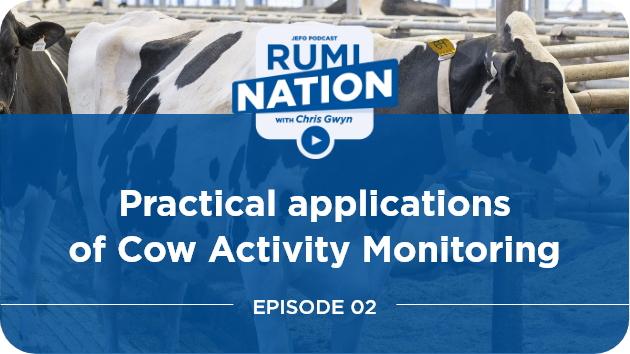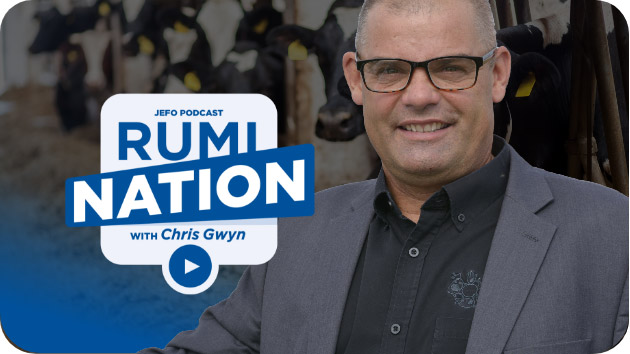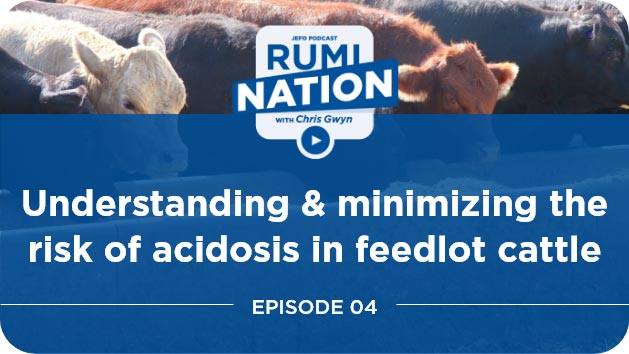RumiNation | S02 : E03
Managing Stressors Affecting
Dry Matter Intake in Feedlot Cattle
Brought to you by Jefo Nutrition
Share now!
Did you enjoy this episode?
Share now!
Managing Stressors Affecting Dry Matter Intake in Feedlot Cattle
What are the stressors affecting feed intake in beef cattle? How can we prevent and manage them? What should we measure and monitor?
Learn more about dry matter intake in feedlot cattle with expert Dr. Garza.
Our guest - Dr. Juan Garza
Dr. Garza has over 40 years of experience in nutrition and management consulting in the beef industry. He completed his MSc at Iowa State University and his PhD at Oklahoma State. During his career, he has worked closely with many of the top beef producers in Mexico, including many of the feed companies that supply nutrients to the feedlot industry. Dr. Garza focuses his knowledge and experience consulting to improve management and nutritional practices that impact beef producers’ profitability.

Timestamps & Summary
01:24:00 – Would you give the audience an overview of the key stressors and how they impact dry matter intake in feedlot cattle?
There are multiple stressors that can affect dry matter intake in feedlot cattle:
- Heat or cold weather
- Humidity
- Changes in formulation
- Feeding schedule
- Feeding characteristic (such as protein and fat content)
- Animal comfort
Their effects vary on the short and long terms according to different factors.
Short-term (daily) effects depend on:
- Feed management
- Weather
Long-term effects depend on:
- Sex
- Age
- Frame size
- Initial body weight
- Final body weight
- Average daily gain
- Energy concentration of the diet
04:15:00 – What kind of performance differences have you seen in the past from a farm that does a really good job managing these stressors compared with a farm that let them go by?
Every stressor affects the performance and profitability. For example, if we increase feed intake by 2%, the performance would increase by 4%.
05:47:00 – What general practices do you recommend producers to help them deal with or minimize stressors in feedlot cattle?
First, we must identify the stressors affecting feed intake in feedlot cattle. Once we know the stressors, like a lack of space or the heat, we can address them.
Other things to check closely are the diet and feeding schedule. The feeding schedule must be consistent and be adjusted according to the heat.
10:32:00 – What are the nutritional modifications you might need to make during stress periods?
We can look at the fibre percentage and consistency of servings.
Also, feed additives like potassium, iron, vitamins, probiotics, and essential oils help cope with stressors affecting the animal feed intake.
16:55:00 – What would be some of the key take-home points for the audience to manage their cattle through periods of stress?
There are many different stressors affecting the animal performance, but feed intake is the main tool that you need to measure on a daily basis and tie up with performance as 70% of the productive response is explained by feed intake.
To help the animal deal with stressors, you need to implement the correct management such as animal comfort, water space availability, and diet characteristics. Feed additives also help reduce the impact of the stressors.
Also, we need to plan ahead. If a heat wave is coming, we have to implement some changes right away like giving the animal more space, water, and shade.
The last very important thing to check if the serving time. You need to be consistent as it helps reduce digestive upsets.
The key is a good management with prevention and measurement.







